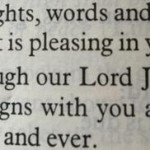“What a waste…”
You hear that from people, often, when they meet a handsome priest or a pretty nun, and even more often when they encounter monastic life. They either cannot believe that a life “apart” can be rich and meaningful or they believe (as one gent wrote me) that “women were made for bearing children and enriching the world through the family” and take issue with this sort of life – a life of prayer and separateness which has a long tradition in Christianity (predating Protestantism) and – although differently – in Buddhism. From a Christian perspective it’s pretty hard to ignore St. Paul, and his thoughts and appreciations of the distinctions between a vocation of marriage or of a life dedicated solely to God:
An unmarried woman or a virgin is anxious about the things of the Lord, so that she may be holy in both body and spirit. A married woman, on the other hand, is anxious about the things of the world, how she may please her husband.
The Poor Clares in Galway, Ireland have a very comprehensive website that received over a million hits its first week out. They have a picture gallery, personal stories, various prayers, lots of FAQ‘s and so forth, and you can lose a very merry hour clicking around over there, which is not surprising since – in general – Poor Clares tend to think they have “A Right To Be Merry”.

(Poor Clare of Bethlehem Monastery, Barhamsville, VA)
Which, in fact, they do, as do we all. But a merry heart seems to be the particular hallmark of the Poor Clares, wherever you find them. In full disclosure, I was thisclose to becoming one, a long time ago, and so I have always had soft spot for these gals.
Getting back to the Irish Poor Clares, I like the musings of the father – visiting his daughter, Sr. Faustina, who has been enclosed for 13 years:
“The Poor Clares are hugely important to Galway, I think…after the doctors, the psychiatrists, the alcoholic counselors and everyone else has had their say, people end up at the door here, and seeking their prayer and consolation.” — Visiting Father of Sr. Faustina, who has been enclosed for 13 years.
(source)
I wouldn’t call that sort of life – one that offers prayer and consolation for the sake of the whole world – a wasted one at all. Here’s how the sisters, who St. Francis referred to as the “poor ladies” or “those Christian women”, describe their day:
Our day is centred on the Mass and Eucharistic Adoration, which is at the heart of our vocation. The community prays the Divine Office together seven times during the day. Again at midnight we rise to pray together and spend time in Adoration. This prayer is our most important “work”, around which our day revolves…
They rise at midnight to pray for us, for those who cannot or will not pray for themselves, or who – in those tempting hours of the night – are lost and trying to find themselves by the emptiest means.
Nuns have no holidays; imagine not having a full, uninterrupted night’s sleep, for the rest of your life!
The Poor Clares go barefoot or – when that is not practical, as in a cold, damp Irish climate – wear rough sandals. They eat no meat, and while they grow vegetables in their garden, they have a silly habit of growing even more flowers. They depend upon the kindness of benefactors for much of their proteins – milk, eggs, cheese – and if cabbage is all there is to eat of a day, then cabbage it is, for every meal. What moneys they make through altar breads and sewing (if they even offer such work, as this house does) usually goes fully toward the upkeep of the house.
We haven’t turned our backs on the world and its troubles, even if the opposite may appear to be the case. We believe that our prayers reach the deepest recesses of human suffering and draw down God’s grace.
Our withdrawal from the activities of the world is not a flight from the reality of suffering and the struggles of life but a place of encounter with them. Many people write to the monastery to share their problems and ask for prayers. As we struggle with our own difficulties in the light of God’s love, we feel a deep solidarity with them, believing that God can transform the most desperate situations.
It has been incredible to discover a deep inner freedom that lies in facing the reality of who we are – warts and all – and embracing every part of ourselves in the midst of a loving community. This can be hard but liberating as we continue to find an inner peace and joy that does not come from what we own, being in control, gaining approval, or following the latest trends. In appreciating and accepting the beauty and giftedness as well as the weakness and brokenness in ourselves and in each other we see the transforming power of God’s infinite and unconditional love in our lives.
Nah, I don’t see any “wasting” going on there. Seems pretty rich and full of meaning, to me.











